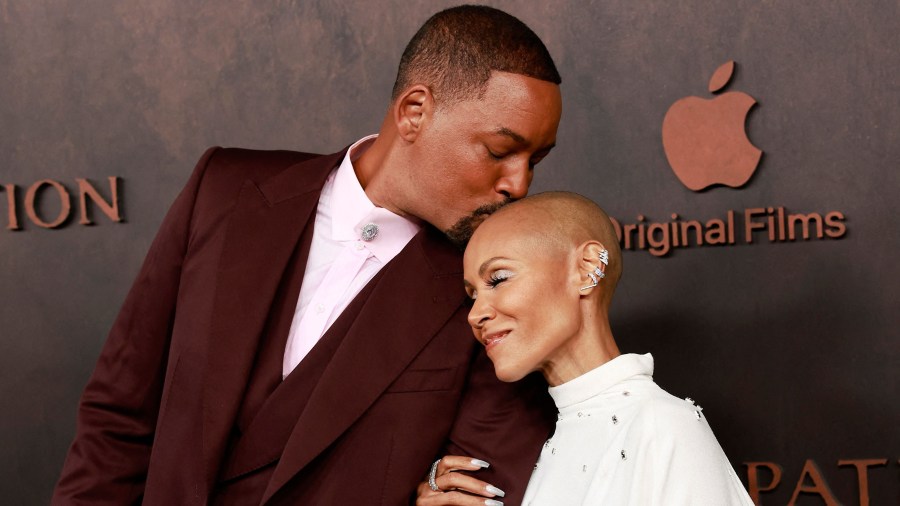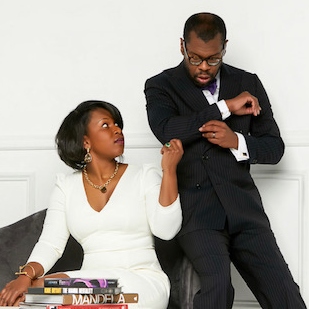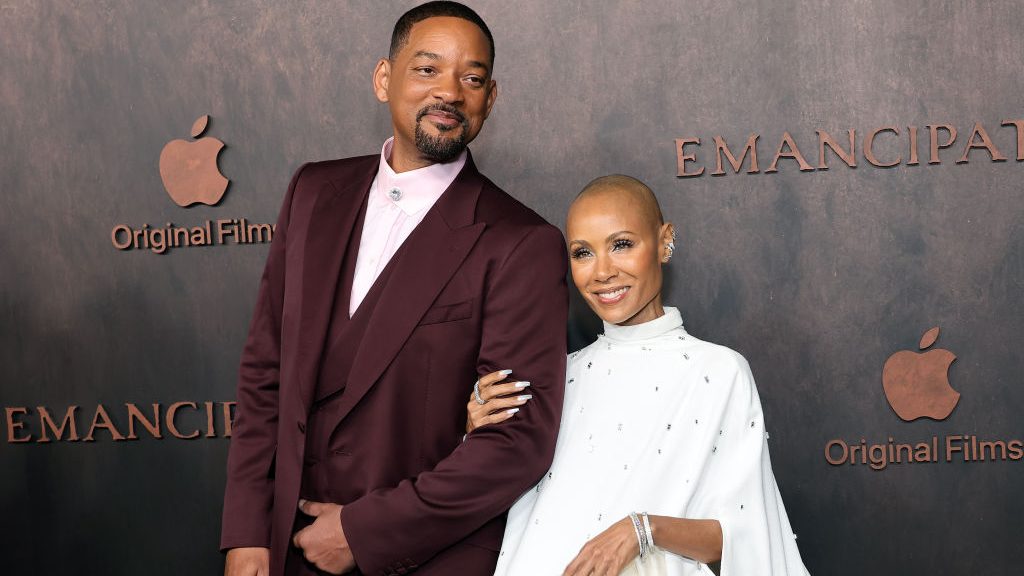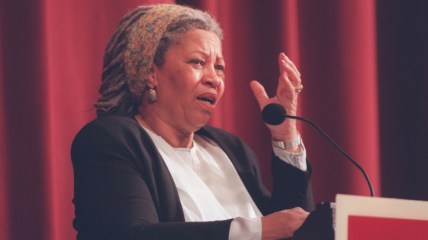Union, how you feel it: Navigating spiritual revelations in modern relationships
As celebrity bombshells upend traditional notions of marriage, married theologians Revs. Alisha Lola Jones and Calvin Taylor Skinner challenge us to embrace complexity.
“Notes on faith” is theGrio’s inspirational, interdenominational series featuring Black thought leaders across faiths.
To be completely honest, marriage has never been one-size-fits-all for anyone. As spiritual advisors, we are often presented with the intricate task of counseling individuals and are bound by confidentiality not to disclose the specifics of their negotiations. These negotiations are not new. What is new is the public’s comfortability with learning the various scenarios of non-conformity in life partnership.

Even the premise of marriage (or any other expression of covenant) is not always about love; some are not concerned with finding their one true love. Marriage can be about partnership (business or otherwise), protection of assets, ticking clocks concerned with having children, the hybrid of stability and flexibility of an open relationship, a preference for gender roles in maintaining a household regardless of one’s sexual orientation, exercising discretion about one’s identity, or any form of arranged marriage in one’s culture. As many well-known couples increasingly allow the public to glimpse the secrets behind the veil covering their relationships — including Will Smith and Jada Pinkett Smith, Beyoncé and Jay-Z, and, most recently, Meryl Streep and her husband of 45 years, sculptor Don Gummer — it is worth remembering that love, intimacy, and marriage are nuanced and sometimes separate propositions.
As two individuals who have observed our parents navigating their roles in marriage, we came into our relationship already bearing our own perceptions and experiences. Add to that other elders and peers whom we have walked alongside, our various community and cultural values (both real and unrealistic), and there was and still is much we are navigating in our marriage. However, what we do care about are three tools our marriage counselor and spiritual big brother, Rev. Dr. Otis Moss III, pastor of Chicago’s Trinity United Church of Christ, guided us through. These are the ethics we suggest young couples consider for their path.
Personality compatibility matters — and high character is the glue. Personality compatibility speaks to how well you and your partner’s communication style, temperament and emotional intelligence align. Although personality compatibility, among other traits, is important, possessing character encompasses values, integrity and ethics at the core of an individual. And since none of us are perfect, character helps with navigating challenges and committing to a relationship that is safe and integrity-centered.
Be conscious of how you deal with celebration and struggle. Popular culture emphasizes the euphoria that comes from love and being loved. But the true test of a relationship is how one responds to another person when their back is against the wall. Do you know how to manage your emotions while being considerate of another person’s needs?
Love — over everything. Placing love at the center of one’s plans and decision-making changes the quality of how we move through the world. Adding another person’s well-being to how you move inevitably means there will be sacrifices, growth, and change. Can you embrace them — even when they may also include the agreements in one’s marriage as well?
Actress Jada Pinkett Smith’s revelations in her memoir “Worthy” illustrate modern complexity in partnerships, underscoring the need for spiritual guidance that transcends orthodox tenets and embraces more fluid, authentic forms of connection. Though the unfolding story has been fatiguing for many of us to witness, she does bare the soul of her decades-long union with Will Smith, not just as a wife but as an individual continuing to seek her truth while they share a life together.
Their story, filled with turbulent moments lived publicly and privately, mirrors the spiritual journey many couples face, albeit away from the spotlight’s glare. It prompts us to delve deeper into acts of revelation — akin to public catharsis or confession — about the metamorphosis of relationships, disclosing the truth that people’s relationships might be more intimate friendships than conventional unions, acknowledging the seasons and levels of compatibility.
In her memoir, Jada challenges the traditional perceptions and models of marital success, an institution typically valued for its longevity and conventional norms, and instead offers introspection and a semblance of truth-seeking. While both her and Will’s testimonies may be publicly contested for their veracity – after all, they are actors – they can nevertheless lead to profound personal and mutual understanding. Jada’s story suggests that there is spiritual significance in disclosure — those moments of raw honesty, vulnerability, and self-realization that alter our inner landscapes for the rest of our lives.
Furthermore, the evolution of Jada and Will’s relationship from romantic partners to “friends and business partners” living separate but eternally joined lives illustrates the spiritual marriage some choose and the involuntary partnerships some are unwilling to name. Unlike traditional marriages bound by legal and societal expectations, spiritual marriages can be flexible unions with ever-evolving terms negotiated independently of societal norms. Spiritual marriages are about honoring the sacred, often unspoken, vows made to each other to walk together throughout life, unconditionally. Here, love isn’t possessive or restrictive; it’s liberating, granting each person the freedom to grow, change, and even diverge.
In “Worthy,” Jada’s and Will’s story unfolds as a spiritual union that doesn’t collapse under the strain of change in its dynamics but morphs into a different shape, accommodating individual journeys, shared history, and common goals. The chatter about the memoir’s details may be sensational, but is also a reminder that love and commitment are an ongoing conversation; the revisions can continue, and it doesn’t have to be an all-or-nothing game.
A public ritual of self-disclosure isn’t merely about unearthing hidden affairs or revealing untold secrets. It’s about confronting the obstacles within us, the “generational trauma” we inherit, and the personal battles we fight. It’s about confronting the social performances we undertake, wearing masks and enacting the scripts we have been given without writing our own story or speaking for ourselves. This isn’t confession as known in religious parlance, seeking absolution from a divine power, but a secular catharsis where the forgiveness sought and granted springs from the wells of human understanding and compassion.
This confrontation is captured when Jada writes of swallowing her voice, a “habit of self-betrayal” in which she touches upon the ways in which we sabotage ourselves, a common human experience.
Beyond its more shocking revelations, Jada’s story sparks much-needed conversations and controversy about how we partner through the seasons of our life, especially for new generations navigating what it means to be in a life partnership, often without instruction manuals to guide us through new developments. “There’s a lot to learn here,” she asserts, highlighting that even in life partnerships, we are lifelong learners of our needs and desires. Loving partnership is a living, breathing journey, not a tidy, fairytale destination. It’s a journey of becoming and negotiating, and negotiating again — often painful, filled with revelations and catharsis, demanding the courage to confront and embrace not just our partner’s truths, but our own.
In our pursuit of partnership, perhaps we need to actually do it how we feel it, revising the traditional blueprints of relationships and marriage and instead embracing the spiritual and personal revelations that come from honest confessions and authentic living. For in this sacred space of standing in our own truth, we don’t just find each other; we find fuller selves. And in that profound discovery lies our ultimate worthiness.

Rev. Dr. Alisha Lola Jones is a faith leader helping people to find their groove in a fast-paced world, as a consultant for various arts and faith organizations and professor of music in contemporary societies at the University of Cambridge in Cambridge, England. She is an award-winning author of Flaming? The Peculiar Theopolitics of Fire and Desire in Black Male Gospel Performance (Oxford University Press). For more information, please visit DrAlisha.com.
Rev. Calvin Taylor Skinner is dedicated to empowering frontline communities in Knoxville, Tenn. and the United Kingdom. He uses Faith and Policy to address energy justice, criminal justice reform, voter education/mobilization, electoral politics, and global affairs. Along with his wife, Rev. Dr. Alisha Lola Jones, they lead InSight Initiative, a consulting firm focusing on capacity building and live events production.
TheGrio is FREE on your TV via Apple TV, Amazon Fire, Roku, and Android TV. TheGrio’s Black Podcast Network is free too. Download theGrio mobile apps today! Listen to ‘Writing Black‘ with Maiysha Kai.


